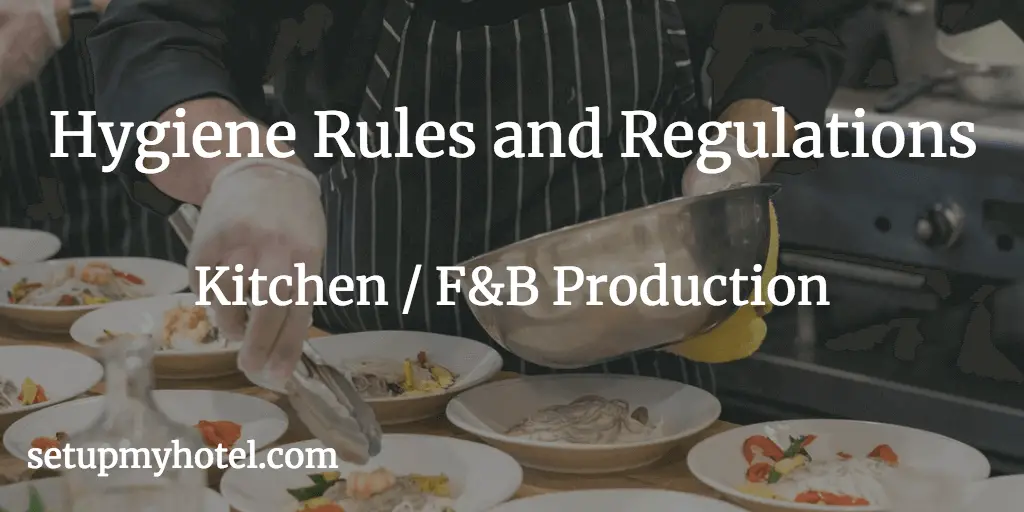Hygiene Rules for Hotel Kitchen and Food Production Staff
Maintaining proper hygiene in a kitchen is essential for the safety of the staff and customers. Kitchen staff and chefs must follow several rules and regulations to ensure that the food prepared is safe for consumption.
Firstly, it is crucial to wash hands thoroughly with soap and water before handling any food. Hands should be washed after using the restroom, sneezing, coughing, or touching any unclean surfaces.
Secondly, kitchen staff should wear clean uniforms and aprons. Hair should be tied back, and any loose jewellery should be removed to prevent contamination of the food.
Thirdly, all kitchen equipment and surfaces should be kept clean and disinfected regularly. This includes cutting boards, knives, and utensils.
Finally, food should be stored at the correct temperature to prevent the growth of bacteria. Raw meat should be kept separate from other foods to prevent cross-contamination.
Following these hygiene rules and regulations can help prevent foodborne illnesses and create a safe and healthy environment for everyone in the kitchen.
- Kitchen staff and Chefs should wear clean uniforms, aprons, and hats when handling food.
- Uniforms and hats must not be worn outside the premises as this might cause contamination.
- Kitchen staff must always wear the issued closed shoes and socks and in any case, no slippers or bare feet are allowed while working in the kitchen.
- Kitchen staff must be showered and shaved daily when reporting to work.
- Chef’s hair must be clean and short and for females, if hair is too long to shoulder, it must be tied back off the face.
- Nails are to be clean and short to avoid any food contamination.
- Staff must not wear watches or jewellery, except for a plain wedding ring and small earrings.
- Staff must not wear strong perfume or aftershave while working in the kitchen.
- No food and drink consumption in the food preparation areas should be allowed.
- Smoking in the kitchen or preparation area is strictly prohibited.
- Hands must be washed thoroughly with soap and water and dried with a paper towel.
- Avoid touching food with your bare hands when preparing or serving it.
- Always wear plastic gloves or use clean serving utensils when handling food.
- Do not lick your fingers while handling or tasting food use a spoon instead.
- Do not blow your nose, cough, or sneeze over food.
- If any kitchen staff is suffering from vomiting, diarrhoea other stomach upsets, skin complaints, or cuts inform your supervisor immediately.
- Cuts and abrasions must be covered by an easily detectable waterproof medical strip e.g. bright yellow color.
- Any raw food like chicken, meat, pork, etc. must never come into contact with cooked / ready-to-eat food.
- Chefs should never use raw eggs in cooked preparations.
- Never use the same equipment or working surfaces for raw and cooked ready-to-eat foods without thoroughly cleaning and disinfecting them first.
- Use cutting boards according to their colour code; Green Cutting Board = Vegetables Only, Red Cutting Board = Meat Only, Yellow Cutting Board = Chicken Only, White Cutting Board = Fish Only.
- Always put food into appropriate clean containers and cover them.
- Never place or store any food containers on the floor.
- Thoroughly wash all fruits and vegetables before using them.
- Never reuse any of the food coming back from the guest.
- Never mix old food with new.
- Reheat cooked food preparations in small portions and at least at 80° Celcius.
- Hot food must be kept at above 63ºC during display or the holding area.
- Always use a clean, calibrated, and sanitized probe thermometer to measure temperatures.
- Cooked food preparations must be chilled rapidly under cold running water or by spreading on a clean tray to avoid bacteria.
- Label raw and cooked food preparations before putting them into the fridge or freezer.
- Never freeze defrosted food again as it might cause contamination and bacteria buildup.
- Regularly monitor the temperature of fridges (0°-5°) and freezers (-18°) at least once a day.
- Always use the FIFO [First in – First out] method in fridges, freezers, and storerooms.
- Ensure proper labelling procedures are followed to adhere to the FIFO method.
- The Executive chef should monitor the daily and monthly cleaning schedule report.
- Always handle cleaning chemicals with care and store all chemicals away from food.
- Remove garbage frequently but in any case after the night shift.
- The kitchen stewarding area should be kept clean and tidy at all times.











